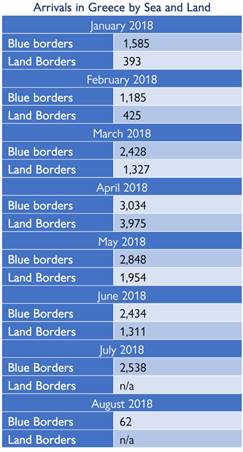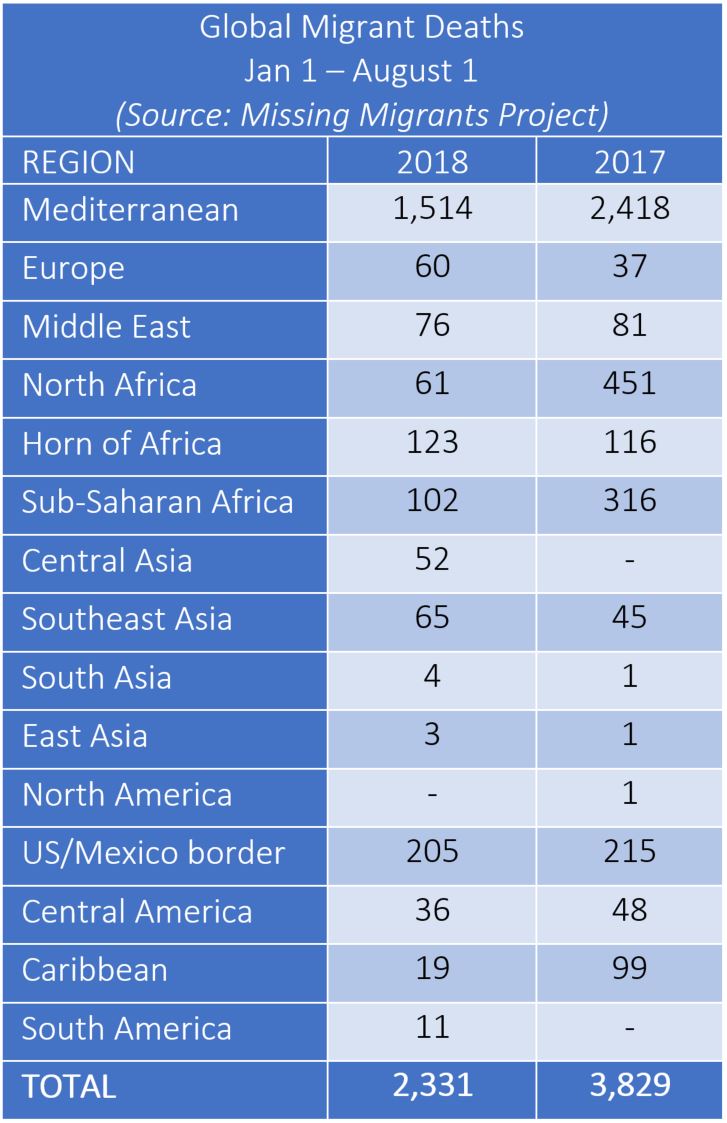-
Who we are
WHO WE AREThe International Organization for Migration (IOM) is part of the United Nations System as the leading inter-governmental organization promoting since 1951 humane and orderly migration for the benefit of all, with 175 member states and a presence in 171 countries.
-
Our Work
Our WorkAs the leading inter-governmental organization promoting since 1951 humane and orderly migration, IOM plays a key role to support the achievement of the 2030 Agenda through different areas of intervention that connect both humanitarian assistance and sustainable development.
What We Do
What We Do
Partnerships
Partnerships
Highlights
Highlights
- Where we work
-
Take Action
Take Action
Work with us
Work with us
Get involved
Get involved
- Data and Research
- 2030 Agenda
Mediterranean Migrant Arrivals Reach 58,158 in 2018; Deaths Reach 1,514
Geneva – IOM, the UN Migration Agency, reports that 58,158 migrants and refugees entered Europe by sea through 1 August 2018. That total compares to 113,283 at this time last year, and over 261,228 at this time in 2016.
Arrivals to Spain (see chart below) in July overtook those to Italy and have surpassed the total number of arrivals (22,108) recorded in Spanish waters during all of 2017. This year almost 40 per cent of all Mediterranean irregular migrants have come via the Western Mediterranean route, whose irregular migration volume has more than tripled that registered on the route by this time last year.
Mediterranean Developments

As remarkable as Spain’s rise in irregular migration activity has been through 2018, more significant is this summer surge. Over the year’s first five months, a total of 8,150 men, women and children were rescued in Spanish waters after leaving Africa – an average of 54 per day. In the 62 days since May 31, a total of 14,898 have arrived – or over 240 migrants per day (see chart below).

The Western route also extremely deadly, with over 300 fatalities recorded through 1 August – a nearly 50 per cent increase over all of last year’s total: 224.
Most recently, IOM’s Missing Migrant Project recorded a young man drowned off the coast of Tangiers, Morocco on 30 July. He was travelling with two other friends on a small inflatable raft when it capsized off Achakkar, near Tangiers. The two friends survived and were taken by local civil protection authorities to the hospital.
IOM Athens’ Antigoni Avgeropoulou said Thursday that in the three days from 30 July through 1 August, the Hellenic Coast Guard (HCG) reported at least two incidents requiring search and rescue operations off the islands of Kos and Samos. The HCG rescued a total of 55 migrants and transferred them to those respective islands. Additionally, arrivals to Rhodes and Lesvos this week bring the total number of sea arrivals to Greek territory since 1 January to 16,114.
April remains the busiest month for irregular migration by land and sea to Greece, with a total of 7,009 men, women and children arriving. February was the lowest with 1,610 (see charts below).


IOM’s Ivona Zakoska reported that arrivals to Bosnia and Herzegovina between January and end of July 2018 reached a total of 10,023, ten times more than the 1,116 reported for the whole of 2017. One third of all registered migrants were of Pakistani origin, followed by 16 per cent of those who declared Syrian nationality and 13 per cent of those who declared Iranian origin.
According to the information received from IOM field staff present in Bosnia and Herzegovina, there are an estimated 4,500 migrants present in the country, mainly in Velika Kladusa (Una Sana canton) close to the border with Croatia. IOM is supporting the Government to increase the accommodation capacities of the official reception centres in the country by refurbishing and preparing the infrastructure to add additional 1,200 places to the existing capacity which is currently less than 600.
Increase in arrivals has been observed also in Albania and Montenegro. An estimated 1,358 irregular migrants attempting to cross the Albanian-Greek border were registered in Albania so far this year, four times the 354 reported in the same period in 2016 and almost ten times more than the 178 reported between January and July 2017.
Moreover, arrivals to Albania at the end of July 2018 exceeded the 752 registered in the whole of 2017. More than half of migrants who arrived this year are from Syrian Arab Republic (55%). Pakistani (10%), Iraqi (8%), Algerian (6%) and Moroccan (5%) are the remaining nationalities registered among the top five nationality groups this year. Similar nationality breakdown is registered also among the 740 migrants who are apprehended on exit from Albania to Montenegro (top five nationalities – 43% Syrian, 25% Pakistani, 7% Iraqi, 4% Libyan and 3% Palestinian).
In Montenegro, authorities registered 2,473 arrivals between January and July 2018, ten times more than 266 registered in the same period last year and 20 times more than 125 reported at the end of July 2016. Further on, arrivals this year are already triple the 807 registered in the whole of 2017. As in Albania, Syrian Arab Republic is the first registered nationality in Montenegro this year (42%), followed by migrants from Pakistan (18%), Algeria (11%), Iraq (8%), Morocco (6%) and Libya (4%).
Worldwide, IOM’s Missing Migrants Project has documented the deaths of 2,332 people during migration to international destinations in 2018 (see chart below).
In Europe, the remains of a 14-year-old boy were recovered by Greek authorities from the Evros river on the Greece-Turkey border on 29 July. According to a forensic expert, it is likely the boy died three months before. In Serbia, two migrants were shot near the town of Dobrinci, 45km northwest of Belgrade, on 1 August, according to Serbian police.
On the US-Mexico border, the remains of five migrants were recovered in the last few days, two of them in Texas and three in California. On 21 July, the remains of a 27-year-old woman from Guatemala were retrieved near Laredo, Texas. According to her family, she left her hometown in Guatemala’s department of Sololá in late May, with the aim of crossing the border into the US. The last time they heard from her was on 7 July, the day she left Mexico to cross the border.
Additionally, remains of a young man from El Salvador were found in an irrigation canal in El Paso County, Texas on 30 July. In California, remains of three migrants were retrieved over a period of four days last month. One young man died of dehydration after crossing the US-Mexico border near Calexico. His remains were recovered in a remote area on 21 July. Three days later (24 July), the remains of another migrant were found in a ranch in Imperial County, California. On 25 July, US Border Patrol officers found the body of the third migrant 17km east of the USBP East Port of Entry in Calexico, California.
Missing Migrants Project data are compiled by IOM staff but come from a variety of sources, some of which are unofficial. To learn more about how data on migrants’ deaths and disappearances are collected, click here.

For latest arrivals and fatalities in the Mediterranean, please visit: http://migration.iom.int/europe
Learn more about the Missing Migrants Project at: http://missingmigrants.iom.int
For more information, please contact:
Joel Millman at IOM HQ, Tel: +41 79 103 8720, Email: jmillman@iom.int
Flavio Di Giacomo, IOM Coordination Office for the Mediterranean, Italy, Tel: +39 347 089 8996, Email: fdigiacomo@iom.int
Hicham Hasnaoui, IOM Morocco, Tel: + 212 5 37 65 28 81, Email: hhasnaoui@iom.int
Atigoni Avgeropoulou, IOM Greece, Tel: +30 210 99 19 040 ext. 166; M. +30 69 48 92 98 09, Email: avgeropoulou@iom.int
Kelly Namia, IOM Greece, Tel: +30 210 991 2174, Email: knamia@iom.int
Ivona Zakoska, IOM Regional DTM, Austria, Tel: +43 1 5812222, Email: izakoska@iom.int
Julia Black, IOM GMDAC, Germany,Tel: +49 30 278 778 27, Email: jblack@iom.int
Christine Petré, IOM Libya, Tel: +216 29 240 448, Email: chpetre@iom.int
Ana Dodevska, IOM Spain, Tel: +34 91 445 7116, Email: adodevska@iom.int
Myriam Chabbi, IOM Tunisia, Mobile: +216 28 78 78 05, Tel: +216 71 860 312 (Ext. 109), Email: mchabbi@iom.int